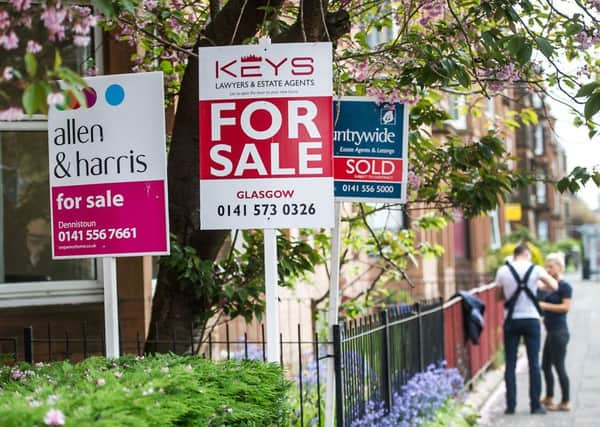House price growth slows amid squeeze on spending power
This article contains affiliate links. We may earn a small commission on items purchased through this article, but that does not affect our editorial judgement.


Halifax, Britain’s largest mortgage lender, said that residential property prices between May and July were 0.2 per cent lower than in the previous 12 weeks and represent the fourth successive quarterly fall.
It is the first time this has happened since 2012. Halifax’s monthly index showed that prices rose 0.4 per cent in July, only partially offsetting a 0.9 per cent decline recorded the previous month.
Advertisement
Hide AdAdvertisement
Hide AdAverage prices across the UK in the three months to July were 2.1 per cent higher than in the same three months last year, but this was down from 2.6 per cent in June and is the lowest annual rate of growth since April 2013.
Russell Galley, managing director at Halifax Community Bank, said: “House prices continue to remain broadly flat, as they have since the start of the year.
“Improvement in the jobs market has not, as yet, boosted wage growth, resulting in earnings rising at a slower rate than consumer prices.
“This squeeze on spending power, together with the impact on property transactions of the stamp duty changes in 2016 now being realised, along with affordability concerns, appear to have contributed to weaker housing demand.”
Across the UK, the average house price stood at £219,266 in July. This is £64,603, or 42 per cent, higher than a low point seen in April 2009.
Annual house price growth is now running at just under a quarter of the levels seen in March 2016, when property values were increasing by 10 per cent year on year.
Advertisement
Hide AdAdvertisement
Hide AdHowever, Galley added that a continued low mortgage rate environment – with interest rates at historical lows of just 0.25 per cent – combined with an ongoing shortage of properties for sale, should “help continue to support house prices over the coming months”.
Howard Archer, chief economic adviser to the EY Item Club Scotland, said the monthly house price rise in July was “lacklustre”, saying “housing market activity and prices remain under pressure from the serious squeeze on consumers”.
He said the downside for house prices should be limited by the shortage of housing stock, and that “high employment and very low mortgage rates are also currently supportive”.
However, Archer added: “We maintain the view that house prices look unlikely to rise by more than 2 per cent over 2017. House prices could well be essentially flat over 2018.”
Mark Harris, chief executive of mortgage broker SPF Private Clients, said house prices would benefit from there being “no immediate interest rate rise on the horizon”. Supply issues would also remain a support, he added.